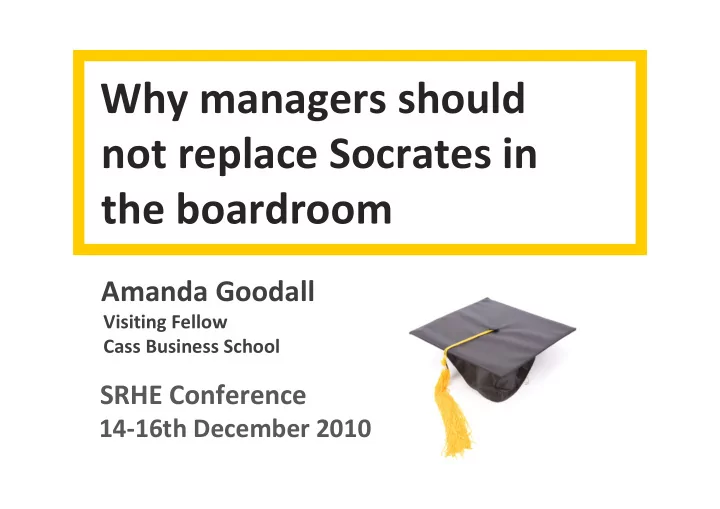

Conclusion The higher a president’s lifetime citations, the more likely it is that their university will improve its performance in future Research Assessment Exercises
This finding has been replicated in other settings, for example:
Empirical study of clinician-leaders and hospital performance in the US • Hospital CEOs – clinicians or non-MD managers?
Empirical study of clinician-leaders and hospital performance in the US • Hospital CEOs – clinicians or non-MD managers? • CEOs in the top-100 hospitals in Cancer, Digestive Disorders, and Heart & Heart Surgery. (‘America's Best Hospitals’ 2009 U.S. News and World Report)
Empirical study of clinician-leaders and hospital performance in the US The higher a hospital’s performance score, the more likely it is that its CEO is a clinician and not a manager
Proportion of Physician Leaders and Non-Physician Leaders across the Top 100 U.S. Hospitals in the Field of Cancer: By Quartiles* 25 *Data from U.S. News and World Report 'Best Hospitals' 2009 Physician-Leaders Non-Physician Leaders 20 15 10 5 0 Hospitals Hospitals Top 25 Hospitals Ranked Ranked Hospitals Ranked 26 - 50 51 - 75 76 - 100
Professional basketball • Star basketball players make better basketball coaches (Goodall, Kahn & Oswald, July 2008) • Using data from 15,000 basketball games we found that basketball teams in the NBA won more games if led by coaches who were star players or had long playing careers • Controlling for other factors that affect team performance
Part 3 of my study asks: Why might it matter if a leader is an expert?
Why might it matter if a leader is a top scholar? Four possible explanations arose from interviews with 26 heads in UK and US universities
Explanation 1 A leader must be credible to followers. An accomplished scholar appears more credible, which enhances a leader’s influence
“The rationale for ranking academic excellence very highly is the enormous importance we place on the president having the respect of the faculty. Without that, it is very difficult to lead a research university.” Shirley Tilghman, President Princeton
Explanation 2 Leaders with high technical ability have developed expert knowledge about the organization’s core business -- research and teaching
“A leader who is an academic helps to mobilize people. People are much more important in academic institutions than conditions. Everything in a university flows from the academic value of faculty.” Anthony Giddens, former Director LSE
Explanation 3 It is the responsibility of leaders to set the academic standards
“ Leaders are the final arbiters of quality. Therefore it is right to expect the standard bearer to first bear the standard.” Patrick Harker , former Dean Wharton School
Explanation 4 Selecting a top academic to lead a research university sends out a signal about priorities
“Being a researcher sends a signal to the faculty that you, the president, share their scholarly values and general understanding. It also sends an internal signal to colleagues that research success in the institution is important.” Amy Gutmann, President University of Pennsylvania
The message from this research about leadership
In organizations where the core business is knowledge-focussed such as universities, R&D units, banks, and professional service firms, we should look to hire leaders who are experts not just managers 16 December, 2010
One important consideration There must be a fit between the leader and the organization’s strategy and key workers George Bain, former head of LBS, WBS and Queens University Belfast
“Whether a leader is an outstanding researcher or just respectable is relative. It depends on where an institution is and where it wants to be. A second- tier university wishing to raise its research standing may want a first-tier academic. The leader should represent the aspirations of the institution.”
What effect might academic- leaders have on faculty and university strategy?
What is the core business of a university? 16 December, 2010
What is the core business of a university? 1. Research and teaching 2. The core workers are faculty 16 December, 2010
What are the conditions under which core workers will flourish? 16 December, 2010
What are the conditions under which core workers will flourish? If a leader has prioritized research and teaching all their life, they may know the best conditions under which other academics will develop and prosper 16 December, 2010
Managerialism in UK universities 16 December, 2010
“This financial crisis is bad. We may have to lay off Andre…”
Managerialism in UK universities � Between 2004 to 2009 - the number of managers rose by 33% � Academic staff up 10 % � Students up 9% Source: UK Higher Education Statistics Agency. 16 December, 2010
When a pulse survey exposes that 75% of administrative staff would recommend their university to others, but only 40% academic staff will – you know there is a problem. Why? Because the core workers are unhappy
This is a problem because
This is a problem because Like-for-like hiring
“Frankly, Dinsdale, we like the look of you.” 16 December, 2010
In conclusion • Knowledge-based organizations should be led by experts not managers • People who really understand the core business and the key workers
Academic leaders should also head other important bodies involved in higher education policy-making and funding
� Private trusts and foundations (e.g. Leverhulme & Nuffied Trusts) � Higher Education Funding Council for England (HEFCE), Economic and Social Research Council (ESRC), Arts & Humanities Research Council (AHRC), Biotechnology & Biological Sciences Research Council (BBSRC) � European Research Council (ERC) and European Institute of Innovation and Technology (EIT), among others
Recommend
More recommend